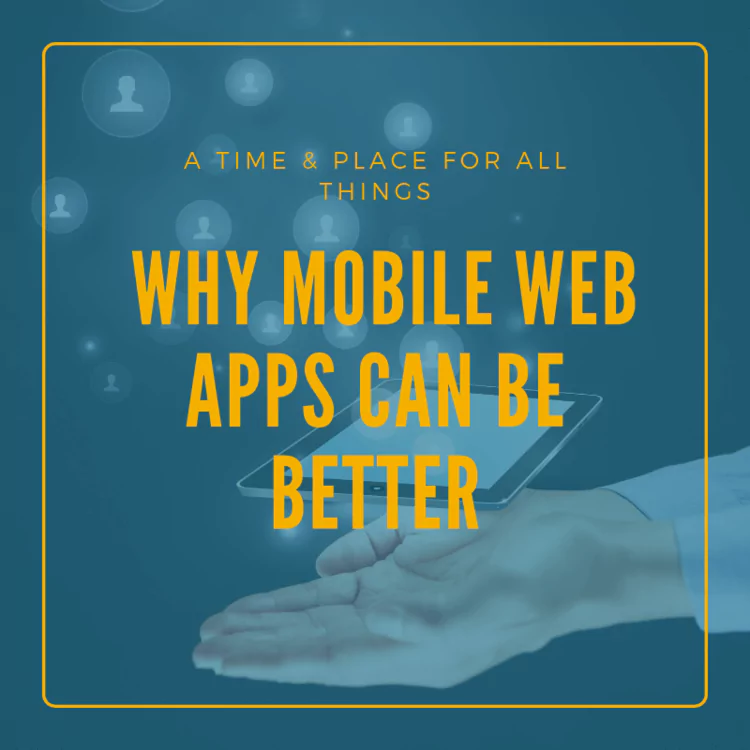Originally published June 5, 2019 , updated on February 16, 2026
Hybrid apps, web apps, native apps, mobile web apps and mobile-optimized websites, talk about a mouth full! In our modern and technological society, online applications, otherwise known as Apps, are multiplying at an astounding rate. It’s no wonder so many people are struggling to keep up or even make sense of what everything is.
Where once our greatest achievement was the internet and launching a website, now there is literally an app for almost anything. From ordering food, delivering goods, checking the weather, and even step counting. Like walking into an exotic bazaar, it’s easy to get lost in the sights and sounds and lose sight of quality over quantity.
So what is the correct time and place for an App? And more importantly how do our popular mobile apps rate against older giants like websites?
To clean up the mess that surrounds the various types of apps, you should make an effort to better understand the key differences between them.

Time Old Websites VS Progressive Web Apps
Ever heard that saying “Back in my day…” If things are judged according to their lifespan then websites will win hands down. In truth it’s a human’s nature to cling to the familiar and name it indispensable. Because of this, there are many that still swear by websites and refuse to budge on the matter. As they say ‘if it ain’t broke, dont fix it’. However, the times are changing and the young take over web apps have become a steady trickle mixing with the tides of trend. So it has become common to see a website as an internet resource that passively gives you information. It might not be really interactive but informative nonetheless.
This is where web apps show their greatest differences and possibly their greatest strength. Suddenly you not only have a resource for information but the jovial experience of interacting with that resource while you learn. User engagement has become the wind propelling our industries forward. Quizzes, questionnaire, puzzles, online chat forums. Suddenly the web is no longer something you can only look at and store things on, you’re becoming a functioning part of it!
Localised Native Apps
Mobile web applications are an interactive feature-rich and responsive website that exists in your mobile device browser. You can easily find it via a search engine which doesn’t have to be installed on the device you want to use. Its efficient, convenient and a great example of it would be News 24.
This differs to a native mobile app which is a piece of software. It is written specifically for a target mobile OS in the OS-compatible languages and installed on the storage of a mobile device. For example WhatsApp.
Mobile Websites VS More Modern Mobile Web Apps

So just to get one thing straight, just because they have gone and put “mobile” in front of the word website, doesn’t actually mean that the original concept of websites has changed. They are still the before mentioned resource that passively gives you information. In Fact, the only difference between a “normal” website and a “mobile” one is that you may no longer be confined to your desk and desktop by extension. Now you can find and use that website on your phone’s built-in browser.
This differs from Mobile Web Apps in the sense that it is a client–server computer program. The client runs it in a web browser.
Hybrid Applications
As a simple definition check will tell you the term, hybrid is used to describe a thing made by combining two different elements. Similar to a web app, this type exists within a browser. But, it doesn’t have complete and free access to the device its being used on. The perfect time in choosing to develop a mobile hybrid app instead of a mobile web app would be if you want to drive more engagement. You can ask users to install it on their devices, enable offline-use and have a possibility of sending push-notification. Great examples of hybrid apps would be Instagram or Snapchat.
Progressive HTML5 Web Apps
As one of the world’s leading programming languages, it’s only natural that it would lead to web app development. Being coined with terms like web app revolution, these types of apps enhance functionality. They also and bring out existing advantages of other regular mobile web applications.
For example, while still being discoverable via a web search, progressive web apps can also be installed on a mobile device. The technical capabilities of HTML5 apps are fast surpassing those of hybrid apps now and are approaching native app functionality. It has now reached the point where any HTML5 app is capable of push notifications, offline work, and read all data input types. They can even access functions on a device like the earphone, voice record and camera options.
Implementing Web Apps In The Name Of Success

Web applications have come a long way since they were first created. They have become the leading forum of interaction and outreach. They change the way people fo things and help create a more convenient world. There are many reasons why one should invest in app development and make it a part of our daily tools. Our future is not only bright but exciting as well! Who knows where we will be in years to come. Perhaps a tech savvy populous evolving on the applied advancements of our current minds and capabilities of the future ones.
Post Views: 1161




















